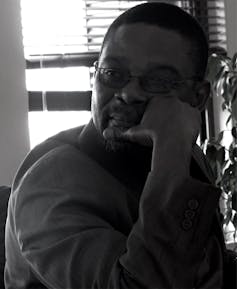A tribute to poet and professor Harry Garuba: we continue to learn with you


Natasha Himmelman, University of the Witwatersrand; Nicole Sarmiento, University of Cape Town, and Thuto Thipe, University of Cape Town
I wish I could let the language of the chained roar let loose rivers of rage to cleanse this land…
And build for you a memorial ageless as your love.
– Harry Garuba, Memorial wish, Animist Chants and Memorials: Poems (2017)
Professor Harry Garuba died on 28 February 2020.
Harry’s investment in words and their power started early in his life. He was born on April 8, 1958 in Akure, Nigeria. Growing up in a household with a healthy library, he devoured books throughout his childhood. He was always reading. At the age of 19, Harry’s one-act play Pantomime for Saint Apartheid’s Day was published in the Festac Anthology of Nigerian New Writing.
He earned his Bachelor’s through to his PhD degrees between 1975 and 1988 from the University of Ibadan’s English Department, where he also taught for 16 years. In 1996, Harry was a founding member and columnist for the Nigerian national daily newspaper, The Post Express. Harry used his words to illuminate where political shadows cast darkness.
Grammars of love
In 1998, Harry moved to the University of Zululand’s English Department and began the chapter of his life in South Africa. He joined the University of Cape Town’s English Department and the Centre for African Studies in 2001. The university remained Harry’s academic base for the next 19 years.
He always insisted that we call him Harry. He wasn’t one for pomp. For him, weighing steadily every word was as important as listening fiercely. For Harry, aesthetics and politics were indivisible. He was a poet who cared deeply – in lectures and in the day-to-day grammars of love that encompass organising, cultivating and sustaining radical hospitality. Two of the places in which he did this were at the Centre and at its African Studies Gallery. Harry’s humility belied his global stature. His laugh came easily, and his generous storytelling taught lessons that his students grew into for many years after he shared them.

We collectively knew Harry for more than 15 years. Though short in his lifespan, they represented nearly our entire adult lives, as well as most of his tenure at Centre for African Studies. It was also during these years that he was his most prolific, gifting us with Museums, Mimesis, and the Narratives of the Tour Guides of Robben Island; How not to think Africa from the Cape; African Studies, Area Studies, and the Logic of the Disciplines; Chinua Achebe and the Struggle for Discursive Authority in the Postcolonial World; Teacherly Texts. And, of course, the long-awaited Animist Chants and Memorials. This reaffirmed his status as a “true original and one of the finest poets in English” according to the Mail & Guardian.
Producing knowledge
Before arriving at the Centre, he published Negotiating the (post)colonial impasse while he was senior lecturer in English at the University of Zululand. The essay
examines the power of the European ‘archive’ to prevent other narratives from emerging.
Harry’s work has consistently questioned how knowledge is produced. Writing about the map and its practices in Mapping the Land/ Body/ Subject, he explains how
the denial of heterogeneity and multiplicity
fixes and delimits African narrative and boxes in subjectivities and imaginaries.
In Race in Africa, he deftly articulates what is at stake in such containment and closure:
Race as produced by modernity is about the making of the world and the making of individual subjects in the world. It involves the disciplinary and normalising technologies of modern power, which seek to discipline not only the world and the individual subjects in it but also the production of knowledge about the world and its subjects.
Harry tirelessly laboured against the erasure of worlds, people, ways of thinking and being — and offered critical tools with which to knowledge differently.
Crafting worlds
A masterful literary scholar, a voracious reader and perspicacious thinker, Harry’s work privileges African literature as a rigorous, rich intellectual terrain through which to resist, contest and unlearn
the disciplinary apparatus inherited from English literary studies.
Writing with Benge Ogot in Lateral texts and circuits of value, he confronted the assumption of translation in African literature. Looking at Okot p'Bitek’s Song of Lawino and Wer pa Lawino, they theorise a new model:
We need to work with a model of lateral textuality that recognises that each text is inserted into a specific circuit of value that may or may not be similar to or identical with the circuit of value through which the other travels.
As Harry offers in The Ghetto in the Ivory Tower
What a university really transmits is not only the various contents and objects of knowledge but … the manner in which the objects of knowledge are ordered and organised.
To learn from Harry was to learn with him, to be challenged with profound subtlety and astounding brilliance, always in conversation, without pretence or airs, with such love, attentiveness and seeing that one forgot the Poet, the Professor.
Through his eyes, we could imagine and craft worlds, entire universes of unthinkable impossibilities. Through his tireless intellectual, creative and pedagogical labour, he activated futures, inspiring and challenging us to resist and reject epistemological boundaries. He understood the profound significance of education, even beyond the institutions and frames in which they are sited. As he affirms in his 2016 lecture, No Easy Walk to Education
Because historically for marginalised people, for oppressed people, for minorities, racial and ethnic all over the world, education has always been deeply connected to the question of freedom.
In for the long haul, Harry reminded us to pick our battles, conserve our energy, take time for self care. The long road to freedom is arduous, creative, painful. Along this sendero, in the world of paper and the spaces in between, with the Professor, the Poet, being and learning with Harry was nurturing relationships, harvesting friends, comrades, community.
As the voices of the mourners rose one after the other Each burdened with grief and a tale of loss
I swear
I saw the storyteller rise in rebuke, raising a song for the newly enslaved, a story for the many dispossessed and disposable people of our new age those whose stories await a new voice, a new plot
Wondering how many in the gathering had witnessed this wake, this resurrection, I wakened with a story and a smile on my lips.
– Harry Garuba, A wake for the storyteller, Animist Chants and Memorials: Poems (2017)
Natasha Himmelman, , University of the Witwatersrand; Nicole Sarmiento, PhD candidate, University of Cape Town, and Thuto Thipe, , University of Cape Town
This article is republished from The Conversation under a Creative Commons license. Read the original article.